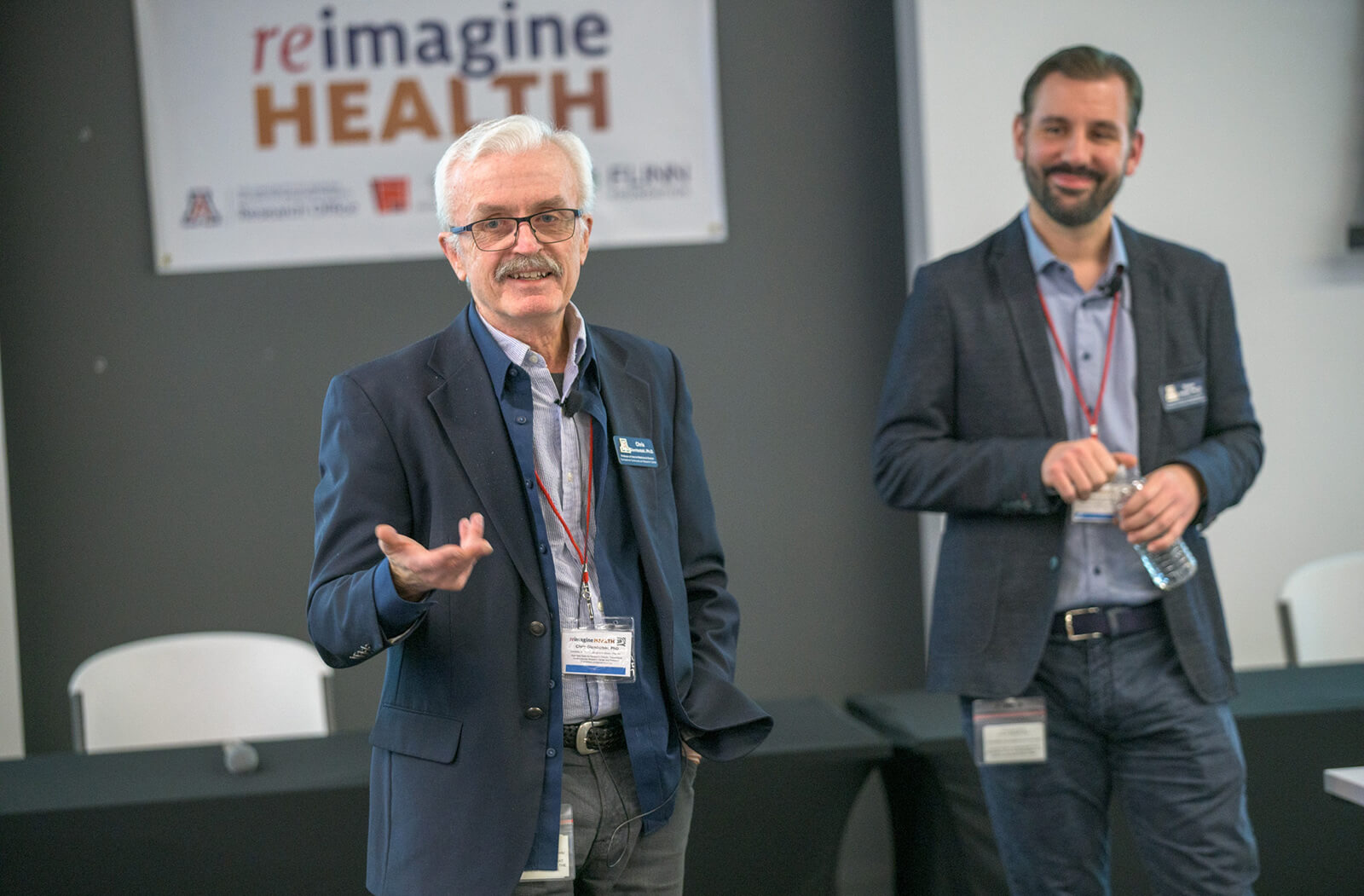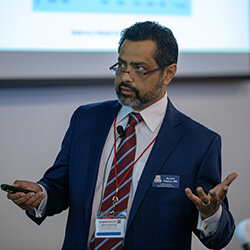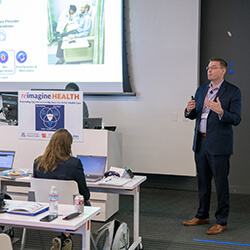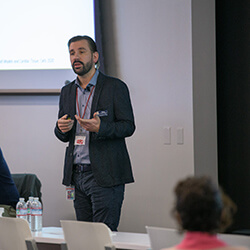
reimagine Health Research Symposium Focuses on Big Data’s Role in Transforming Care

When the DNA sequence of the human genome was solved, it became the basis for groundbreaking translational research. This opened avenues to precision medicine, where scientists use a person’s own genes or proteins to prevent, diagnose or treat disease. Yet, despite the potential for precision medicine in treatment and diagnoses, significant barriers to effective use of the large amount of DNA sequence information in the human genome still exist.
“There is a large gap between the acquisition of genetic data sets and their use in patient-specific precision medicine-based applications,” said Chris Glembotski, PhD, associate dean of Research and director of the Translational Cardiovascular Research Center (TCRC) at the University of Arizona College of Medicine – Phoenix. “This gap underscores the importance of the topics covered in this symposium.”
In his opening remarks, Dean Guy Reed, MD, MS, shared that sentiment. “We don’t do research just for our benefit — just for us to understand how something works. We try to answer questions that will improve health,” he said.
Covering a wide array of topics — such as the genetics of schizophrenia and the transformative potential of diversity in medicine — the symposium welcomed experts in big data management and precision medicine to share how they have bridged this gap in scientifically and clinically powerful ways.
Ayman Fanous, MD
In his presentation, Leveraging Large-Scale Consortium Data to Elucidate the Genetics of Schizophrenia, Dr. Fanous, professor and chair of the college’s Department of Psychiatry, chronicled the history of schizophrenia, its continued impact on public health and how genomic insight is helping to identify the phenotypic architecture of psychiatric illness.

Schizophrenia is highly familial — meaning if one family member has it, the risk for another family member developing the disease is high. This, of course, signals it is also genetic. Through their work, Dr. Fanous and his fellow researchers conduct mega-analyses (gathering all the data and putting it together) of genome-wide single nucleotide polymorphism (SNP).
Dr. Fanous underscored the importance of gathering large, diverse data sets. As their numbers of cases and controls (participants who have been diagnosed with schizophrenia versus those who have not) have increased, so have the genetic risk factors they have been able to discover.
“We would not have been able to identify these important, highly valid genetic risk factors — these SNPs — without multiplying our sample sizes,” he explained. Once the SNPs are identified, physicians can conduct tests to determine a patient’s genetic risk for schizophrenia.
“You can quantitate this; you can count up how many individual risk variants a person has to arrive at a quantitative measure of their overall polygenic risk to the illness. And that can be used in other studies,” he said.
The study, which is part of the Psychiatric Genomics Consortium, is one of the largest biological experiments ever conducted in psychiatry. And it encompasses many other psychiatric illnesses in addition to schizophrenia, such as post-traumatic stress disorder, attention-deficit/hyperactivity disorder and substance use. Dr. Fanous is the co-chair for the Phenotype Workgroup for schizophrenia.
In addition to his studies with the Psychiatric Genomics Consortium, Dr. Fanous discussed the Precision Medicine Initiative. Launched by President Barack Obama in 2015, the initiative — and the idea of precision medicine as a whole — hopes to enable physicians to target treatments for individuals based on their genetic code, as well as other factors like lifestyle.
It was a topic that transitioned seamlessly into the presentation proceeding his, regarding the All of Us Research Program. Directed by the National Institutes of Health, All of US was designed to improve health care through research.
Jason Karnes, PhD
Dr. Karnes, associate professor of Pharmacy Practice and Science at the R. Ken Coit College of Pharmacy, is the director of Scientific Programs for the All of Us Research Program. He highlighted how All of Us is leveraging diversity in medicine to discover transformative health care solutions.

The need to capture data that provides a more comprehensive view of a person drives the program’s mission to create as a diverse array of data as possible. In doing so, they will have the potential to study a myriad of potential drug responses, adverse drug reactions and disease.
More importantly, All of Us is not a closed resource. “It's a publicly available data browser where you can search your term; you can search a drug name; you can search an RS (unique label) number for a SNP; you can search a disease code or procedure. Right? You can get a sense of how many procedures are being performed within this data set,” he said. “And you can get a sense of what the different racial or gender breakdowns are for those different phenotypes that you're interested in.”
This makes the All of Us data a valuable resource for researchers, as well as for the patients who have consented to have their genomes sequenced for the program. If a participant is found to have hereditary disease risk through their genomic testing, they will be alerted; and All of Us genetic counseling resources will then facilitate contact with the participant’s health care provider, who can order additional clinical testing.
Dr. Jason Karnes' primary area of research interest is cardiovascular and immune pharmacogenomics, specifically investigating the utility of genetic polymorphisms to predict adverse drug reactions.
Tobias Jakobi, PhD
A bioinformatician, Dr. Jakobi’s session, Challenges and Opportunities: How Big Data Transforms Translational Research, built upon the exciting promise big data presents for translational research; but it also served as an informative counterpoint to those fundamental benefits.

“With the amount of data that we have, we need machine learning; we need artificial intelligence (AI) to help us understand the data. But we also should not only trust the AI,” he cautioned.
The more advanced and inexpensive it becomes to access information, the more complex and denser it will become. When data sets are over a petabyte — or 1,024 terabytes — the material needs to be archived intelligently; it also needs to be accessible and sortable. “Where does it go? And how does it live as long as it can, so I can access it later?” Dr. Jakobi said.
Researchers, like Dr. Jakobi, ensure that data is collected and interpreted properly, and the machine learning is programmed accordingly. But, Dr. Jakobi warns, “The devil is in the details”.
Dr. Jakobi is an assistant professor of Internal Medicine and a member of the TCRC. He is currently researching the interplay of different RNA species and their underlying functional networks in the heart.
Additional presenters at the symposium included Kenneth Gershing, MD, director of Informatics at the National Institutes of Health/National Center for Advancing Translational Sciences, who spoke about the National COVID Cohort Collaborative; Philip Verhoef, MD, PhD, an associate clinical professor of Medicine in the John A. Burns School of Medicine, University of Hawaii, who discussed combining big science and big data to better understand host response infection; and Jennifer Van Eyk, PhD, the director of the Advanced Clinical Biosystems Research Institute and the Precision Biomarker Labs at Cedars Sinai Heart Institute, who focused on how best to use precision medicine to individualize therapies and diagnostics.
The symposium concluded with a panel discussion featuring Drs. Glembotski, Fanous, Verhoef, Jakobi and Van Eyk further analyzing the potential of big data in the future of precision medicine.
About the College
Founded in 2007, the University of Arizona College of Medicine – Phoenix inspires and trains exemplary physicians, scientists and leaders to advance its core missions in education, research, clinical care and service to communities across Arizona. The college’s strength lies in our collaborations and partnerships with clinical affiliates, community organizations and industry sponsors. With our primary affiliate, Banner Health, we are recognized as the premier academic medical center in Phoenix. As an anchor institution of the Phoenix Bioscience Core, the college is home to signature research programs in neurosciences, cardiopulmonary diseases, immunology, informatics and metabolism. These focus areas uniquely position us to drive biomedical research and bolster economic development in the region.
As an urban institution with strong roots in rural and tribal health, the college has graduated more than 1,000 physicians and matriculates 130 students each year. Greater than 60% of matriculating students are from Arizona and many continue training at our GME sponsored residency programs, ultimately pursuing local academic and community-based opportunities. While our traditional four-year program continues to thrive, we will launch our recently approved accelerated three-year medical student curriculum with exclusive focus on primary care. This program is designed to further enhance workforce retention needs across Arizona.
The college has embarked on our strategic plan for 2025 to 2030. Learn more.